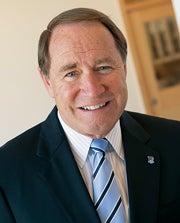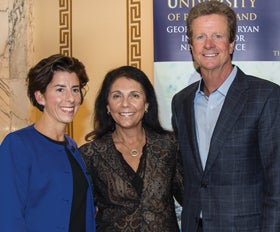President’s View
URI is thinking big about health.

As the year draws to a close and we look ahead to the next, this issue of QuadAngles offers insight into our past as well as a glimpse into our future. If you like historical journeys with an anthropological twist, read about the Paleo-Indian villages that occupied what is now the Atlantic Ocean. Interested in occupations that we never dreamed of at the turn of the century? Check out what our URI entrepreneurs are doing—we’ve got videographers, coffee roasters, and even an organizer of parties for brides-to-be.
The variety and breadth of URI’s activities is not at all accidental. In fact, it is a defining characteristic of our state’s only public research institution. It is a characteristic that inspires us, every day, to draw new connections between established disciplines, connections that result in innovative solutions to entrenched challenges.
In 2013, we announced a remarkable initiative in this context. The George & Anne Ryan Institute for Neuroscience, established with a historic gift from Thomas ’75 and Cathy Ryan, has brought together faculty from dozens of disciplines to teach and conduct research on neurodegenerative diseases and disorders. In November, we announced the Institute’s first director and the Thomas M. Ryan Professor of Neuroscience, Paula Grammas, who comes to us from the Garrison Institute on Aging at Texas Tech University. A leader in the study of Alzheimer’s disease, Dr. Grammas is the perfect person to build the Ryan Institute into an internationally recognized neuroscience center.

And now, as 2016 beckons, I am happy to say a few words about the latest in a string of initiatives bolstering our strengths in the health sciences. The Academic Health Collaborative will spark health-related disciplines, including medicine, pharmacy, nursing, kinesiology and nutrition, psychology, statistics, computer science, and biomedical engineering, to work together in new ways. Every one of our transformational goals for the 21st century—creating a 24/7 learning environment, maximizing the impact of our research and scholarship, expanding our global reach, and becoming an institution that reflects the diversity of our state—fits perfectly with this idea.
The Collaborative also represents an opportunity for incredible economic growth in Rhode Island, as we work with health care partners statewide to develop new intellectual property related to the diagnosis, treatment and cure of disease, new medical devices, new treatment regimens, and new ways to approach population health. Emerging public health challenges like the aging of the entire northern hemisphere, the threats of infectious disease, and the effects of climate change are just the types of issues the Collaborative will address on a local and a global scale.
I’m personally excited about the Collaborative because of my own extensive career working in biomedical research. With support from the National Institutes of Health, I explored basic science that underlies drug development and the roles of particular proteins, enzymes, and metabolic pathways in health and disease. It’s an area that is critically important for the future of everyone on the planet.
The entire URI community—including our alumni, of course—are in the habit of thinking big about the next thing we can do to make a difference in the world. The Ryan Institute and the Academic Health Collaborative are two great examples of where this dynamic thinking leads us.
David M. Dooley
President, University of Rhode Island
 Home
Home Browse
Browse Close
Close Events
Events Maps
Maps Email
Email Brightspace
Brightspace eCampus
eCampus


